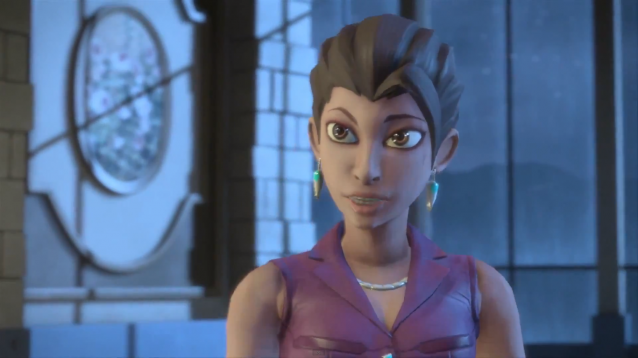

Last night, I stayed up late to watch Sony announce the arrival of the PlayStation 4. I struggled to stay awake immediately beforehand, and I'm pretty tired now (my boyfriend wakes up before 6am), but – between all the marketing buzzwords – the presentation itself was pretty exciting. I'm looking forward to finding out more about the PlayStation 4 and inevitably having my very own to play with. Unfortunately, it turned out to be an evening of mixed emotions, as my peaked interest was tinged with sadness and disappointment at the total lack of women.
Around seventeen male speakers took to the stage last night to talk about the PlayStation 4, with a few more (also male) from Bungie who didn't actually get to say anything. The developers that were chosen to talk about how they felt about the console were also all male; there were around fourteen of those. These are rough counts, because there were so many men involved and I'm not watching the whole two-hour video again (um, at least not yet). But my count of female speakers is definitely not an estimate, because there were absolutely none.
I'm not the only one who noticed:
Dude asks “Who really controls our lives?” at a so-far dude-only presentation. I’LL TAKE DUDES FOR 500 THANKS YVES. #ps4
— Leena (@grassisleena) February 21, 2013
Interesting to note: There were no women on stage at Sony's PlayStation 4 conference. #1reasonwhy
— Ian Miles Cheong (@stillgray) February 21, 2013
I'm pretty sure the only real-life woman who played a role in the presentation was one who played the drums during the pre-recorded Move presentation by Media Molecule. And, of course, the games themselves were dominated by male characters. A female character got some lines in Knack, and the main character seems essentially genderless, so that was pretty cool. But from the rest we got: a woman running away from some men in a tech demo from Square Enix, a woman being assaulted by a man and then saved by another man in Watch Dogs, a couple of female voices in the trailer for inFAMOUS Second Son, a picture of Jodie Holmes from Beyond to show off her numerous polygons, and... I'm sorry, if there were any others I can't remember them.
Now that the facts are laid bare, some people will probably be tempted to think, “Okay, so there were no women on stage. Why does it matter?” and other related questions. So I thought I'd lay out a quick FAQ to explain why this is an issue, and why some of the comments directed at people who've spoken about it are misguided.

This woman is being assaulted by a man and then rescued by another man.
Why does this matter?
Generally, it's depressing to see this lack of representation at any event related to technology. Women make up roughly 50% of the population, and roughly 50% of the population of tech users, and yet we continually face these big events with no one like ourselves present. It isn't the industry's intention, but human psychology dictates that we feel excluded. It's like Sony and these other companies are saying, on a subconscious level, “You are not part of this. We don't care about you.” And that's just people who are only interested in watching the event. Imagine how it must feel to be a woman working on one of these games, or on the console itself, to see dozens of your male colleagues get to stand up on stage and talk about what you've all been working on, with no one like yourself who gets to do the same.
This event is particularly important because it'll go down in the history of the industry. We've come a long way since the announcement of the PS3, and it'll be a long time before we get to see one for the PS5, if consoles are even still relevant by then. This was a good opportunity for the industry to show the world that it has made progress when it comes to social issues, but it was completely wasted. This is the face of the industry for the next few years, and it's a male one.
If it's such a big problem, how come it doesn't bother me?
This is a good question. It sure is easy to assume that if something that doesn't upset you upsets another person then that person must be overreacting, right? Especially if that other person is a woman, given the unfortunate and factually dubious reputation women have for excessive levels of emotional response.
When I was studying for my degree in Psychology, I learned about habituation, which is what it's called when we get so used to an experience that it alters our perception of it. Babies that are repeatedly shown one object become habituated to that object, so that when they are shown it alongside another, they will prefer to look at the latter. We don't pay as close attention to things we are used to, and one thing we are used to is seeing a business represented by lots and lots and lots of men. It's not your fault that you aren't instinctively bothered by the lack of women on stage, it's because your brain has habituated to that. Now that you know, you can be more mindful of the effect.
On top of that, emotion undoubtedly does play a role. I get upset, because I've become increasingly aware of the gender biases that exist and every new example bothers me. But that doesn't mean I'm the crazy emotional person fighting your calm rationality. Emotion colours everything we do; it's what makes us human. Your emotional response just happens to be a different one: your desire for issues like these to be kept from tainting the name of the industry is fuelled by your love for its products.

This woman is being shot by a man before another man has a chance to save her.
What if there just are no women who could have done the job?
I'm afraid I just don't believe that. I haven't got access to any concrete figures for this, but while I know women represent a minority in the industry I also know that there are at least some women who could have walked out on stage and done what most of those men did. I mean, come on, half the speakers were just painful to watch anyway.
But let's say you're right. Let's say someone at Sony looked at the list of speakers, clicked that there was not a single female name, and hurried off to rectify the situation but was totally unable to find even one woman capable of reciting some rehearsed lines on a stage. In that case, we have a desperate situation on our hands. Clearly something is going wrong if there are just no women in any of these roles, and given that there is no scientific evidence that men and women significantly differ in their innate capacities for things like spatial awareness, you can bet it's environmental. What is causing the numbers of women working in technology to – by some reports – actually decrease? That is a very good question, and one I can't answer here, but if you want a flavour I'd recommend you check out #1reasonwhy.
Do you also think Sony should have put transgendered speakers on the stage?
This suggestion came from someone on Twitter, who I think was trying to argue reductio ad absurdum (i.e. that we shouldn't make a fuss about trying to get more women speaking at these kinds of events because if we do then people will start demanding we also cater to transgendered people):
@jawsew I mean seriously stop complaining fuck next time you'll complain that there were no transgender people in a presentantion
— RON BACKSLAB (@Genstrider) February 21, 2013
First, it would be totally awesome if there was a transgender person or two on stage at Sony's event. I would be like, 'Wow, we really are seeing the future, a world in which big companies are actively promoting the fact that they support transgender employees.'
But that's unlikely to happen, and it's not because the people at Sony are transphobic. It's just that transgender people make up a very small minority of the population. It's obviously worth remembering that transgender people exist and trying to cater to their needs and make them feel welcome, but I am not shocked that a presentation with around 30 speakers didn't include one who was transgender. Transgender people do not make up close to 1/30 of the population right now, so the range of speakers was still statistically representative of the population with regards to transgender people.
Women, however, make up half the population. It's the way nature works. If the list of speakers had been statistically representative of the population with regards to women, there should have been around eight of them. But there were none.

This is the back of a woman's head.
Would you be happy if there were female models on stage?
Another question from the Tweeter above:
@jawsew Alright next reveal we'll put tons of ladies on stage with huge tits and tight asses
— RON BACKSLAB (@Genstrider) February 21, 2013
This guy seems to have misinterpreted my desire to see more women on stage. I hope it's not because when he thinks “woman” he automatically thinks “sex object”, which is the only way I can really interpret language like “huge tits and tight asses”. If he's asking whether I want women on stage so that I can look at them and feel aroused/intimidated, then the answer is no. I don't have a problem with models – male, female, or anywhere in between – but I don't think that their presence would be entirely relevant at an event like this.
That said, if any of the many female developers who I'm sure are working on software for the PS4 do happen to have “huge tits” (or small tits, or no tits at all), I'd still be happy to see them (uh, the developers, not the tits) given a chance to talk about their work.
So why do you think this event was approved without any female speakers?
If you've put some thought into this now, you probably feel a bit uncomfortable, because that's what happens when you learn that an ugly truth was staring you in the face all along and you never even noticed. You probably want to feel like you don't have to think about these things. You probably want to lay the blame on someone else. “Well, how did it even get to this stage?” you ask, seeking to remind me that this whole thing isn't your fault.
As @BIGsheep points out:
@jawsew pass. Someone must have looked at that list and went... "it's quite a bromance, you ok with this, Kaz?"
— BIGsheep (@BIGsheep) February 21, 2013
I'm starting to see a trend here. It's becoming clearer to me that these things happen because there is no one sufficiently de-habituated (i.e. someone who has thought long and hard about sexism in the industry, probably – because it's more personal to them – a woman) around to question the status quo. There are fewer women than men in this industry. It is highly likely that no woman in a position to question things ever saw the final list of speakers.
Like with the Dead Island torso, I expect there were no women around to question this decision that made women feel alienated. It's a vicious cycle.

This woman seems pretty cool.
Okay, so how do we break that cycle?
Now that is a very good question. What do you think?
(You can also find this piece on Jordan's blog, Godiva Gamers.)




 Destiny: The Taken King - All King’s Fall Raid Rewards and Loot
Destiny: The Taken King - All King’s Fall Raid Rewards and Loot Immunity: The Fairest Super Power of Them All
Immunity: The Fairest Super Power of Them All The Sims 4 Guide: 8 Ways to Die
The Sims 4 Guide: 8 Ways to Die Portal 2 Once Had Everything That Made it a Portal Game Cut Out
Portal 2 Once Had Everything That Made it a Portal Game Cut Out Empires of Sand: Complete Cheats and Tips Guide
Empires of Sand: Complete Cheats and Tips Guide